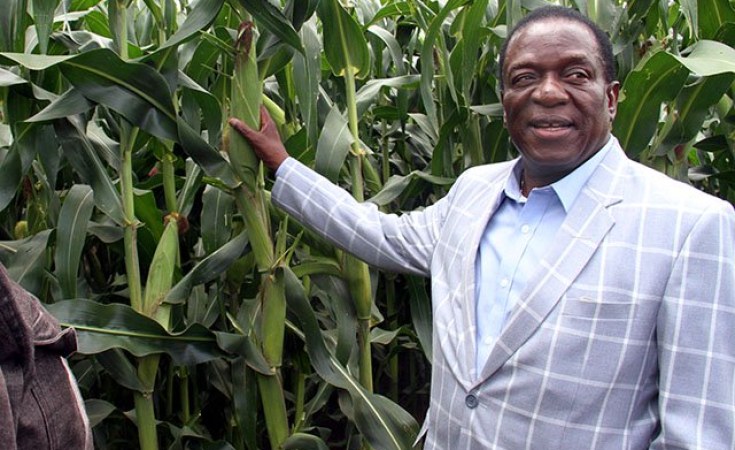Business
Zimbabwe’s Agricultural Recovery to Power Broad Economic Expansion

Zimbabwe’s recovering agriculture sector is set to fuel increased activity across various industries, particularly agro-processing, logistics, and rural retail, according to farming sector players and analysts.
This year’s strong agricultural performance is projected to stimulate growth in downstream industries, including food manufacturing, transport services, and retail operations in rural communities. The sector’s recovery is poised to play a crucial role in driving Zimbabwe towards its 2025 economic growth target of 6%, a significant improvement from the 2% growth registered in the previous year.
Agriculture, a cornerstone of Zimbabwe’s economy, is expected to expand by 12.8% in 2025. This comes after a sharp 15% decline in 2024, primarily caused by drought conditions linked to the El Niño weather phenomenon.
The anticipated rebound is underpinned by better-than-expected harvests of maize, tobacco, and winter wheat, supported by improved rainfall, wider access to inputs, and competitive producer prices. FBC Securities, in its 2025 mid-year economic outlook, highlighted that the sector’s turnaround is already boosting input sales, processing capacity, rural consumption, and freight volumes.
As agricultural production rises, industries reliant on farm output—such as food and animal feed producers—are expected to benefit. Increased activity is also anticipated in beverage manufacturing, construction, and retail, driven by rising disposable incomes in farming communities.
Companies in sectors such as clothing, motor sales, and home appliances are also optimistic about higher demand, with agriculture acting as a key driver. Transport and logistics businesses are experiencing a direct impact as crop movements across the country increase.
Unifreight Group CEO Richard Clarke reported a surge in tobacco-related transportation contracts this year, prompting the company to expand its fleet. “Tobacco remains central to our strategy, and we are seeing higher volumes this year. We’ve secured new merchant contracts to accommodate this growth,” he noted.
Rural economic activity is also improving as farmers earn more from increased agricultural output, leading to higher spending in local stores and businesses.
Zimbabwe achieved a major milestone in its tobacco industry in 2025, surpassing previous records by selling over 323 million kilograms of the crop by the end of June. This marked a 47% increase from the same period in 2024, largely due to the success of contract farming models and stable pricing.
This new record eclipses the previous high of 296 million kg achieved in 2023, according to the Tobacco Industry and Marketing Board (TIMB). Tobacco remains one of Zimbabwe’s top foreign currency earners, alongside gold and platinum. The country is currently the top tobacco producer in Africa and ranks fourth globally in flue-cured tobacco production.
The nation’s wheat sector has also seen notable growth. This year’s winter crop is expected to yield at least 600,000 tonnes, surpassing the national demand of 360,000 tonnes. In 2024, Zimbabwe harvested 563,961 tonnes of wheat, an improvement over the 465,548 tonnes achieved in 2023. The gains have been attributed to government-led initiatives and collaborations with farmers and financial institutions.
Maize production is expected to recover significantly in the 2024/2025 farming season, with projections indicating a harvest of over 2.3 million tonnes. This follows a challenging 2023/2024 season, during which 70% of the country’s rain-fed crops were lost due to drought.
African Distillers chairman Mr. Matlhogonolo Valela expressed optimism about the outlook, citing agricultural recovery, mining, tourism, and infrastructure development as key contributors to future business growth.
The horticulture sector is also poised for strong performance this year. With increasing cultivation areas and maturing orchards, production of high-value fruits such as citrus, avocados, and blueberries is expected to rise significantly. Blueberry output, in particular, is forecast to grow by 50%, reaching 12,000 tonnes compared to 8,000 tonnes in the previous year.
Agriculture continues to play a vital role in Zimbabwe’s economy—not only contributing between 11% and 14% of GDP but also supporting 70% of the population’s livelihoods. The sector supplies 60% of raw materials used by the manufacturing industry and accounts for around 45% of the country’s total exports.
Business
Zimbabwe Bets Big on Biotech to Fuel Industrial Revolution


Dr. Eng. Willie Ganda
By Enia Dube
The Minister of Higher and Tertiary Education, Innovation, Science and Technology Development, Hon. Dr Fredrick Shava, has thrown his weight behind biotechnology as a key driver of the country’s industrialisation and modernisation agenda.
Speaking at the National Biotechnology Authority (NBA) Strategic Planning Workshop in Kadoma, Dr Shava urged the Authority to identify biotechnology-led opportunities that can boost national production and accelerate economic growth.
“Biotechnology serves as a key catalyst for NDS2 implementation, advancing inclusive economic growth, job creation, and sustainable industrial development,” Dr Shava said, emphasising the need to integrate biotechnology into national value chains to unlock a biotechnology-driven economy. He added that this would turn innovation into industry, knowledge into enterprise, and science into jobs.
The NBA has made notable progress in establishing a strong regulatory framework, promoting biotechnology research and commercialisation, and raising public awareness about the sector’s potential. The Authority has successfully commercialised products such as Mapfura wine and Cofsol cough syrup, and has several other biotechnology products in the pipeline.
Incoming NBA Board Chairperson, Professor Idah Sithole-Niang, echoed Dr Shava’s sentiments, emphasising that the Authority’s five-year strategic plan must meaningfully contribute to the attainment of Vision 2030. “This event marks a significant milestone in the Authority’s ongoing efforts to enhance the role of biotechnology in Zimbabwe’s socio-economic development,” she said.
The workshop aimed to realign priorities and resources in response to emerging technologies and global biotechnology trends, and develop a strategic roadmap to strengthen biotechnology as a key driver of Zimbabwe’s socio-economic transformation. The rapidly evolving global biotechnology landscape, including advancements in gene editing, bio-manufacturing, and climate-smart innovations, presents both new opportunities and challenges for Zimbabwe.
“We recognise the pressing need for an inclusive and forward-looking strategic plan that can navigate the complexities of the biotechnology landscape,” Professor Sithole-Niang noted. The workshop was attended by researchers, government officials, and NBA staff, who are optimistic about the potential of biotechnology to drive Zimbabwe’s economic transformation and achieve Vision 2030.
Business
GAS COMPANY, DIRECTOR IN COURT OVER ALLEGED TAX VIOLATIONS

A Harare-based liquefied petroleum gas retailer, Prompt Gas, and its director, Gift Patsika, have appeared in court on allegations of breaching tax and exchange control regulations involving more than R8 million.
The pair appeared before regional magistrate Marewanazvo Gofa on Wednesday.
According to prosecutors, detectives from the CID Asset Forfeiture Unit were deployed on Monday under an operation code-named “Pressure Valve,” which focused on inspecting fuel and LPG businesses for compliance in areas such as licensing, pricing, funding sources and banking transactions.
Investigators visited Prompt Gas premises at 1170A3 Mutare Road, where initial checks indicated that the company had imported gas from Mozambican supplier IPG between January 1 and November 18 this year at a cost of R8,006,055.75.
The State alleges that Patsika failed to furnish proof that the imports were processed through formal banking channels as required. Authorities further claim the company made offshore payments without Reserve Bank of Zimbabwe approval, in violation of exchange control regulations.
The court also heard that the origins of the funds used for the purchases could not be accounted for, raising possible money laundering concerns.
The matter is expected to continue as investigations proceed.
Business
Zimbabwe Slashes Energy Costs in Bid to Boost Economy


The Zimbabwean government has taken a significant step towards reducing business costs and attracting investment by slashing a range of licenses, levies, and fees in the energy sector. This move is part of a broader effort to modernize regulation and make the country a more competitive destination for capital.
The reforms are a direct response to the need to reduce the cost of doing business and accelerate growth in key energy subsectors, said Information Minister Dr. Jenfan Muswere, announcing the measures after Tuesday’s Cabinet meeting. The review followed extensive consultations with ministries, government agencies, and energy sector players, and forms part of the broader reform package approved by Cabinet in July last year.
The Zimbabwe Energy Regulatory Authority licence application fee has been reduced from US$2,500 to US$2,000, while the solar generation licence fee of US$2,875 has been completely removed. The petroleum import procurement license has been cut by half from US$30,000. In rural areas, the fuel retailing license has been reduced from US$200 to US$150, and the LPG retail license fee is being reduced by 50% from the current US$230.
The government recognizes that energy investment had been largely carried by the state, a position that had become unsustainable due to limited fiscal space. The new fee structure is intended to open the sector to more private investors by lowering barriers and eliminating outdated charges. “Government continues to prioritise reforms that improve the ease of doing business in order to attract and retain investment,” Dr. Muswere said.
The announcement adds to a growing list of business reforms underway across multiple sectors, including sweeping license consolidations and fee cuts in retail, hospitality, and financial services. These broader measures have included merging fragmented shop licenses, eliminating redundant permits, capping SME license fees at US$500, and cutting hotel license fees by 50%. Additional refinements to the new energy fee schedule will be finalised before gazetting once ministries complete the necessary legislative and administrative adjustments.
-

 Current Affairs1 week ago
Current Affairs1 week agoOperation restore order
-

 Crime and Courts2 months ago
Crime and Courts2 months agoMasasi High School Abuse Scandal Sparks Public Outcry
-

 Crime and Courts2 months ago
Crime and Courts2 months agoKuwadzana Man Jailed for Reckless Driving and Driving Without a Licence
-

 Current Affairs3 months ago
Current Affairs3 months agoMunhumutapa Day: Zimbabwe’s Newest Public Holiday Set for Annual Observance
-

 Current Affairs4 months ago
Current Affairs4 months agoBreaking: ZIMSEC June 2025 Exam Results Now Available Online
-

 Current Affairs1 month ago
Current Affairs1 month agoBREAKING NEWS: ZANU PF Director General Ezekiel Zabanyana Fired
-

 Current Affairs3 months ago
Current Affairs3 months agoGovernment Bans Tinted Car Windows in Nationwide Crime Crackdown
-

 Current Affairs2 months ago
Current Affairs2 months agoExposed: Harare GynecologistChirume Accused of Negligence, Extortion, and Abuse



